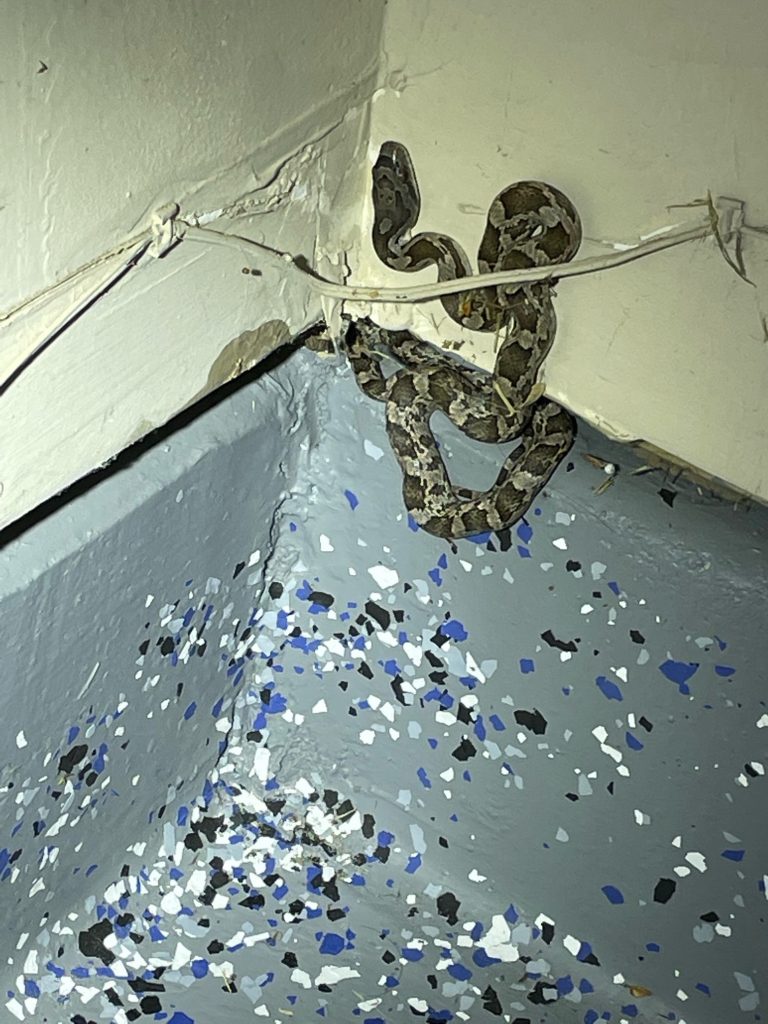A garage affords a homeowner many luxuries, chief among them being extra space, and the ability to store one’s car in a safe place. But garages do have one big caveat: they are susceptible to pests. This is because garages—by virtue of their large doors that are often left open for extended periods of time—are more exposed to nature than any other room in the house, with more potential openings for small creatures to slip through.
Common Pest Infestations in Garages
Jump to garage pests
Don't know what animal is in your garage?
Mice and Rats in Garage
Rodents are very adept at squeezing through tight spaces and into homes. Once inside, they can wreak all sorts of havoc, as they commonly chew through wires when seeking building materials for their nests.
They might also be found living in large appliances, like cars and even ovens. Mice and rats build nests out of whatever materials they can find, and leave droppings that resemble oblong pellets with rounded tips, up to 3/8 of an inch long.
Snakes in Garage
Snakes cannot chew or dig, so garages are often their easiest means of accessing a house. They are cold-blooded and very susceptible to temperature changes, so your garage might offer them relief from extreme heat or cold. Snakes also enter homes to look for food–typically rodents–so if snakes have taken up residence in your home, it’s possible rodents have too.
While it’s not a positive development by any stretch, a snake infestation won’t cause any structural damage. Snakes leave behind skins, and wet, oblong droppings that are pointed and partially white.

Squirrels in Garage
Squirrels usually make their way into our homes when the weather gets colder in the fall, and they begin looking for a warm sanctuary in which to nest, mate, and store food.
Squirrels can enter our homes in several ways, such as through gaps around pipes, loose shingles, and even cracks in your house’s foundation or chimney. Squirrel feces closely resembles rat feces in that it is dark brown, roughly 3/8 inches long, and 1/8 inches in diameter, but unlike rats, squirrel droppings often have pointed tips.
Raccoons in Garage
Mother raccoons frequently enter homes to give birth, so if you find a raccoon in your garage, it’s likely it’s a mother with babies in tow.
To encourage them to leave, open the garage door, grab a radio, and place it near wherever you suspect they’re hiding. Interestingly, raccoons have a greater tolerance for the sound of music than they do for human voices, so tune it to an all-talk show. This will make the mother feel threatened.
Birds in Garage
It’s not out of the question for a bird to zip inside your garage while the door is open. Hopefully leaving the door open will encourage it to zip back on out. You can prevent birds from venturing too close to your property by installing protective tape, decoys, or bird feeders located relatively far from the house.
Rabbits in Garage
Rabbits rarely see garages as a suitable habitat, but can wander in while searching for food. You can use sprinkle cayenne predator or even predator urine around the garage to send them on their way—just remember to open the garage door first.
Moles in Garage
Though they are more likely to be found in yards and gardens, moles may unintentionally find themselves in garages. Most often, this happens when the pests burrow underneath homes and get into garages through holes or gaps in the foundation.
However, moles may also wander into garages aboveground or be carried in by pets. Though moles do not typically enter garages on purpose, the spaces are damp, dark, and moist, which is the kind of environment these pests enjoy most. Still, they need access to soil and food to survive and do not usually stay in garages for long.
Muskrats in Garage
Muskrats are large rodents indigenous to North America. They are semi-aquatic, and are therefore only a potential issue for homeowners living near water. Muskrats can carry diseases like rabies, and have even attacked people on some occasions, so it is advised to contact a professional if a muskrat sneaks its way into your garage.
Why is An Animal in My Garage?
Garages are usually the most accessible part of a house. Garage doors are frequently left open, and even when they’re closed, the seals often degrade over time and leave small gaps that pests can wriggle through.
Also, garages are frequently used for storage, meaning they are often cluttered and full of hiding places, so animals can live in them for considerable amounts of time without even being noticed.
There are many things that can attract an animal into a garage – a few things could include your trash cans being stored inside, rainy weather will drive them inside as well as any other food or water sources.
Jamie Llanos, District Manager
Dead Animal Smell in Garage
If there are animals living in your garage, they might die there, too. Of course, you might not become aware of this until you’re confronted with a terrible odor.
If you attempt to remove an animal carcass, make sure to wear proper PPE like gloves and a mask. The best option is to consult with a professional exterminator. At Trutech, we can safely remove the carcass and eliminate the odor.
How to Get Rid of Dead Animal Smell in Garages
Unless you remove the source of the smell—the animal carcass itself—it can persist for weeks or even months. It is therefore paramount to locate and remove the body, even if it requires calling a professional. Once it has been disposed of, however, there are several things you can do to combat the smell:
Deep clean. The first step is to thoroughly clean the area where the animal died using bleach or another potent household cleaner.
Ventilate. After the death site has been cleaned, increase the ventilation in the house to flush the smell out by opening the garage door and turning on a few fans.
Use odor-eliminating products. You can find these products online or in most hardware stores. Instead of merely covering up the smell, odor-neutralizing products actually trap the smell in granules. Look for brands like Smelleze or Epoleon.
Use natural ingredients. You don’t need to buy a specialized product to contest a dead animal smell. You can also use:
- Vinegar. A few cups of vinegar in the area of the source of the odor.
- Ground coffee. Place ground coffee in the area of the bad smell.
- Baking soda. Mix baking soda with water in a spray bottle and spray the source of the bad odor several times daily.
- Charcoal briquettes. Place several of these around the source of the bad smell to neutralize it.
Animal Control in Garages
The proper solution to solving animals in your garage is installing exclusion devices like a rodent garage door seal. Typical entry points for rats and mice are underneath the garage door seal. When a garage door seal is old, torn or not properly installed this can be an easy entry point for these rodents.
Jamie Llanos
If you’re having issues with pests in your garage, contact Trutech Wildlife. Our team of experts will ensure a swift and ethical resolution to even the most serious wildlife infestations.



